Fighting through Hell to Find Paradise in Phantom Eden
You have been unjustly imprisoned, and cast into the city’s endless dungeons. There’s no way up and out, but rumours say that at the very bottom of the city dungeons is a place of unbelievable wealth and riches, a veritable paradise, a Phantom Eden.
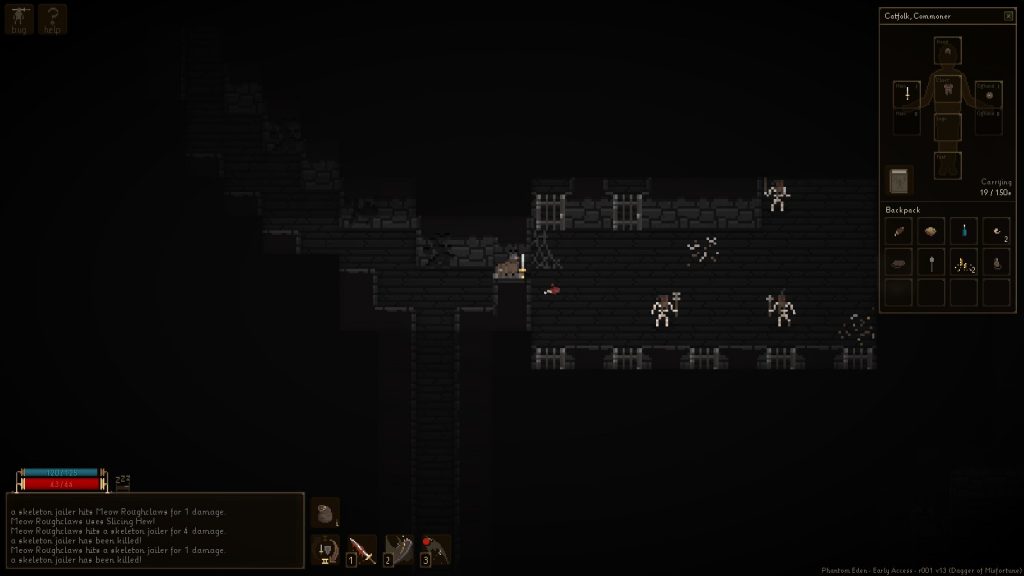
Phantom Eden, from Detocroix Company, takes the traditional roguelike dungeon-delver and swaps around the focus into one of sustenance and interaction, over getting a big sword to hit bigger things to get a bigger sword or die in a stinking pile at around the same depth six times in a row. With extra focus drawn to weapon influenced skills, healing, resting and eating, as well as assembling your own weapons and armour, it’s difficulty comes through enduring the world, rather than conquering it.
Mirko ‘Detocroix’ Koponen the project lead on the game -working with another Finn and a Canadian- set out to create a game that channelled his passion for the Ultima series, with particular nods towards the developer of the fan-made Ultima Ratio Regum. His plan was to combine the more visual and interactive elements of the series with core Roguelike principles; proc-gen maps, randomised loot, permadeath, turn-based gameplay and resource/inventory management.
Phantom Eden first reared its head earlier this year, back in July, when it made it’s way over to Steam’s Greenlight process, we covered it while it was there. It sat in the system for a few weeks before passing in early August. Since then the game has gone into a closed testing state, where it currently sits at version R001 v16(Dagger of Misfortune). I’ve been playing it since v5, and it’s already come a long way.
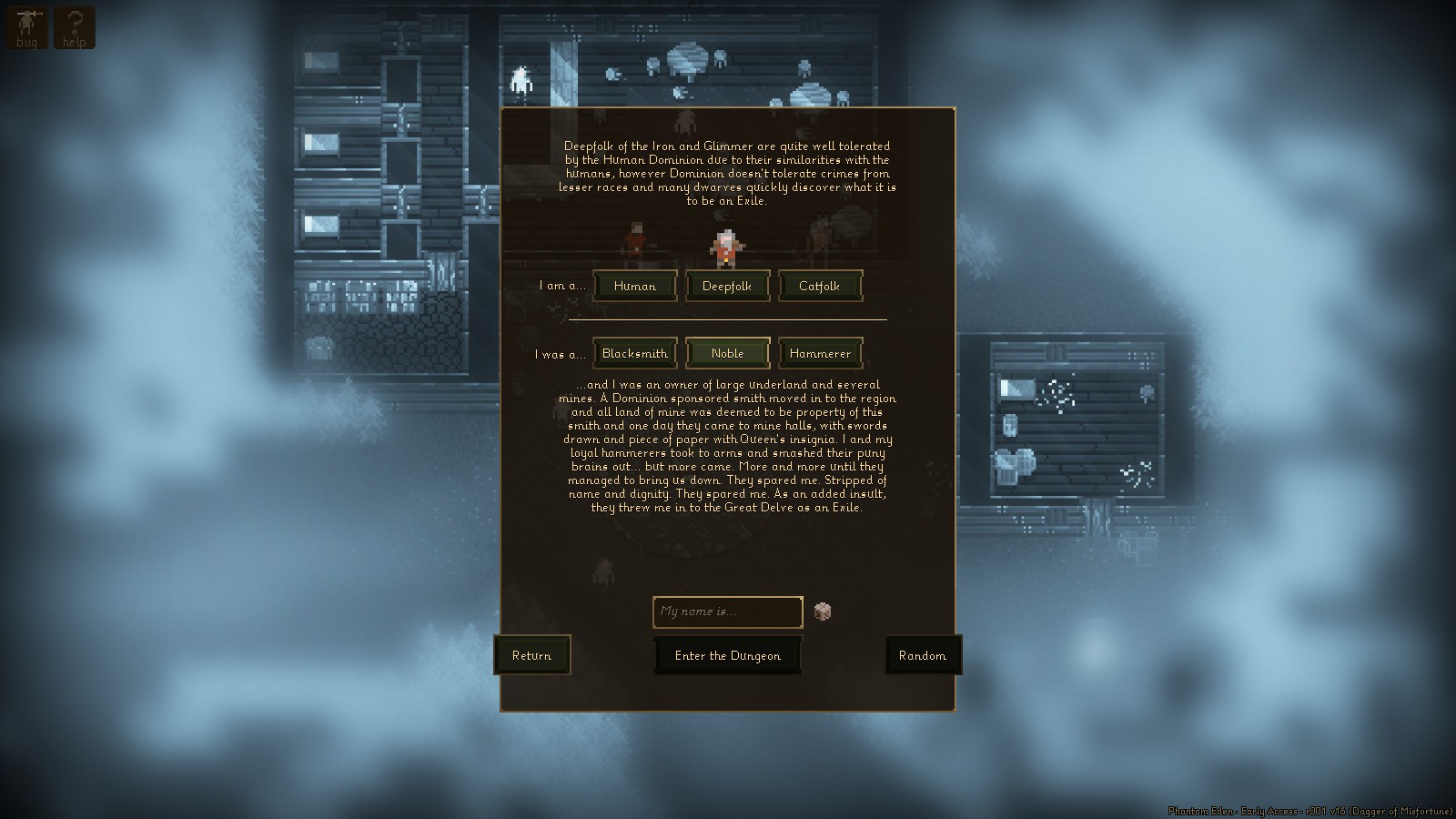
Where better to start than the game’s name? For a start, the titular Phantom Eden is actually different than the Eden that serves as your end goal. In fact, Phantom Eden is going to be a highly interactive hub world that persists throughout any of your attempts outside of the game’s daily challenge mode. In this spectral world, shining blue in stark contrast to the dark dungeons and caves you’ll be delving through, there are ample resources, crafting areas galore, and also the potential (in future updates) to expand the town by adding farming areas and more which can help toughen, and ready, your character up as well as give you time to recover safety.
As with most RPGs, resting in dungeons is dangerous. However, in PE it’s also mandatory; your character will -among other things- get tired, and so you’ll have to set up your bedroll for a few hours or find a bed to rest on. Aside from tiredness you’ll also be fighting off starvation, dehydration and diseases, as well as having to staunch any gaping wounds and fix any busted bones. Closer to release you’ll also be fixing up armour and weapons, as well as mixing up potions and poultices to keep yourself going.
So, the spectral world of Phantom Eden might seem like an overly generous boon, but when you’ll spend your darker moments stuffing torn cloth in bloody gashes, clamouring around for a safe-place to refill your inventory of mugs and bottles, and stockpiling axes so that your luckless, blacksmith Deepfolk can try and keep a bit more range from the vicious orcs that seem to be densely populating the mushroom ridden deepways… When you spend your time doing that, you won’t consider Phantom Eden a boon, indeed you might hold onto the seed that forms a portal there for a little bit longer, just so you can make the most of it.
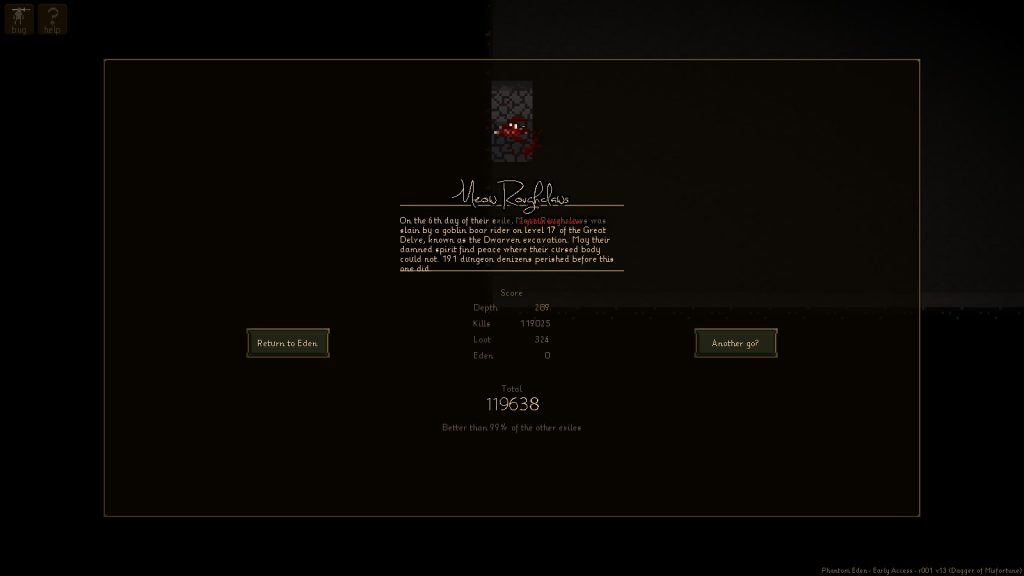
I have -as anyone who has played a LAN game of any CRPG with me can tell you- a major taste for inventories, hoarding, and picking a place dry. There’s a lot of people like that out there; it starts with something simple, something like not using up the potions because you’ll definitely need them much more later on, or collecting all those radscorpion tails and cigarette cartons because of their high value to weight ratio. Soon enough you’ve got a party member just carrying scroll cases and gem bags, or you’re moving pieces around in the inventory just so you can fit another spring in to make another spike-trap later. At the current time of playing the game has just had several bags added in for storing extra materials, which is handy because beforehand it was a punishingly limited 12 slot backpack.
12 slots is dangerously tight when the world’s items are all useful. You’ll want to keep some food, some drink, ammo for your weapons as well as any medication you’ve made, your bedroll and possibly even a spare weapon. The world is littered with useful things, like firelighters, wood for fuel, consumables for potions, as well as everything you’ll need to bake your own delicious bread. Ores, moulds, blades, flights and shafts for arrows and bolts, there’s a mass of stuff that would all serve a use, and you spend most of your time kicking it aside because diving deeper brings more danger and ways to travel to Phantom Eden are rare; you can always sweep back to get the stuff if you can secure enough sustenance to warrant it later.
The game’s levels become increasingly elaborate as you delve deeper, with more of the bespoke rooms seeming to pop up, as well as the fact that there are entire floors geared towards a boss fight — one at the end of the abandoned prisons pits you against a large squad of skeletons and a few hounds before coming face to face with a giant, deadly, former executioner. Other sections of the game feature race specific interactions, crafting tables, and watering holes which serve as amazing safe-spaces that you probably wouldn’t want to leave should you have been in the situation in real-life.
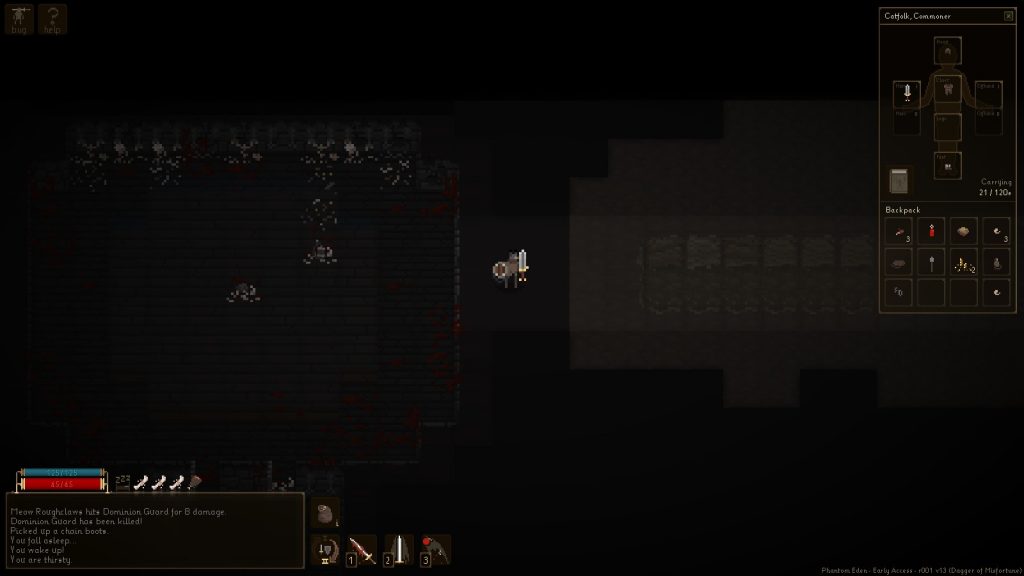
I mentioned earlier spare weapons. My time with the boss and his underlings was made easy because I had stumbled across a large mace, as it turns out the current build of the game includes damage types, meaning blunt and bludgeoning weapons are more dangerous to the undead, while as you pass into the maws of an orc stronghold you’ll want to switch to bladed weapons.
As the game features no class system, instead of giving you a purified RPG setup, there are no restrictions on which weapons you use. Aside from the aforementioned mace, there’s quite a variety currently included, from the very toss-able hand-axes through crossbows to zweihanders; I also stumbled across a very detailed two-handed staff, however, the weapon didn’t seem finished at the time as it had no skills attached to it., which made it stick out from the rest.
Attack and defensive skills are in most games restricted to certain weapons; you’ve learned to create a dervish with your axe, of course, you can’t use it with a sword. Games handle this in various different ways, Vandal Hearts II’s ‘unlocked’ and transferable weapon skills, or FFIX’s skills learned from equip. Many-most RPGs just have character classes or character-specific unlock trees. Phantom Eden however, much like the fantastic Battle Brothers, has the skills entirely derived from the weapon class. If you have an axe you’ll do axe-y things with it, if you have a shield you may, in fact, do shield-y things with it – simple.
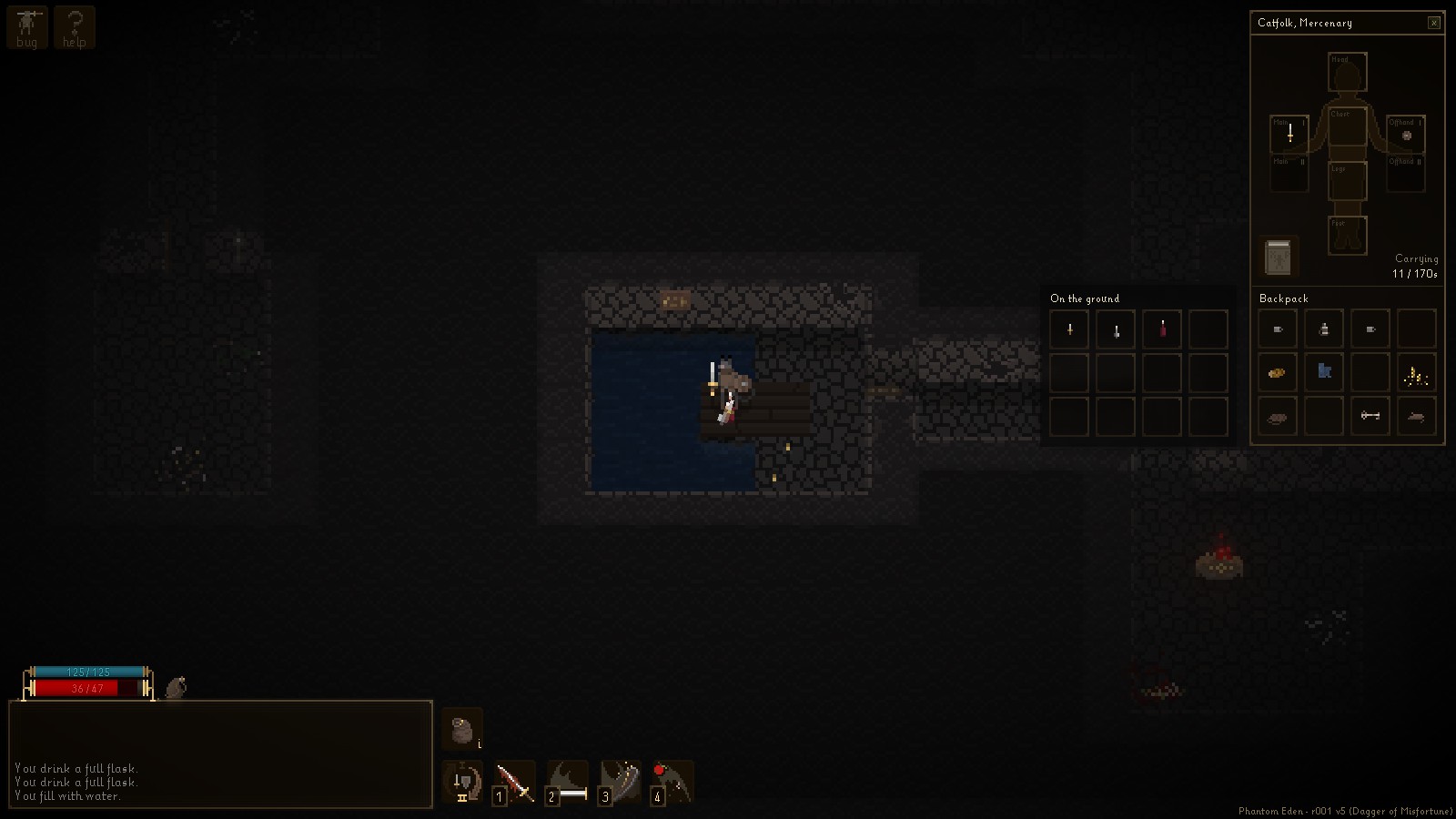
More powerful or decisive attacks and manoeuvres will use up more of your stamina, meaning you can’t just stand there and fight endlessly with powerful moves, as you wouldn’t expect to in a real-world situation. It’s a robust and satisfying system that already plays well at this early stage.
A final thing worth mentioning -before I wrap up- is that the controls for the game are built to be extremely user-friendly. Numpad buttons tie to the attack types, there is a ‘swap weapon group’ button on the lower toolbar, and there’s a simple inventory button which opens a screen then nesting more. Outside of this, you can use either keys or mouse-clicks to move around the game world, and right-click to open up a short interaction menu which hosts context-sensitive options. It’s very simple and very user-friendly, and that’s not a bad thing at all.
The current build certainly has some weaknesses; a lack of audio, a few text errors, and an absence of a few planned features, as well as the to-be-expected bugs. However, the build has been revised through ten builds since I started playing it, the developers have reacted well to feedback, and a massive amount of content has been added. While there’s no launch date in sight, the progress that has been made in a short time is very encouraging.
Comments are closed.